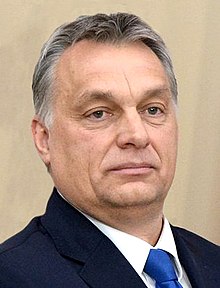Viktor Orbán
| Viktor Orbán | |
|---|---|
 |
|
| Prime Minister of Hungary | |
|
Assumed office 29 May 2010 |
|
| President |
László Sólyom Pál Schmitt László Kövér (Acting) János Áder |
| Deputy |
Tibor Navracsics Zsolt Semjén |
| Preceded by | Gordon Bajnai |
|
In office 6 July 1998 – 27 May 2002 |
|
| President |
Árpád Göncz Ferenc Mádl |
| Preceded by | Gyula Horn |
| Succeeded by | Péter Medgyessy |
| Member of the National Assembly | |
|
Assumed office 2 May 1990 |
|
| Personal details | |
| Born |
Viktor Mihály Orbán 31 May 1963 Székesfehérvár, Hungary |
| Political party | Fidesz |
| Spouse(s) | Anikó Lévai (1986–present) |
| Children | Ráhel Gáspár Sára Róza Flóra |
| Alma mater |
Eötvös Loránd University Pembroke College, Oxford |
| Signature | |
| Website | Official website |
Viktor Mihály Orbán (Hungarian pronunciation: [ˈorbaːn ˈviktor]; born 31 May 1963) is a Hungarian politician and jurist. He has been Prime Minister of Hungary twice: currently, since 2010; and from 1998 to 2002. He is also the present leader of the national conservative Fidesz party, a post he has held since 2003 and, previously, from 1993 to 2000. On November 19, 2016, Orbán surpassed István Bethlen as the 3rd longest-serving Prime Minister in Hungarian history.
Born in Székesfehérvár, Orbán studied law at Eötvös Loránd University, graduating in 1987. He briefly studied political science at Pembroke College, Oxford before entering politics in the wake of the Autumn of Nations at the head of a reformist student movement—the Fiatal Demokraták Szövetsége ("Alliance of Young Democrats"), the nascent Fidesz. He became a nationally-known politician after giving an address at the reburial of Imre Nagy and other martyrs of the 1956 revolution, in which he openly demanded that Soviet troops withdraw from the country. Following the transition to democracy in 1990, he was elected to the National Assembly and functioned as leader of Fidesz's parliamentary caucus until 1994. Under his leadership, Orbán shifted Fidesz away from its original classical liberal, integrationist platform toward center-right national conservatism. After Fidesz attained a parliamentary plurality in the 1998 elections, Orbán governed the country for four years at the head of a right-wing coalition government.
...
Wikipedia
